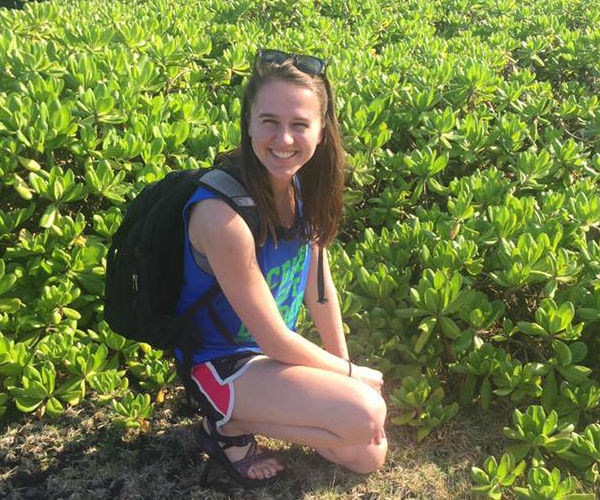
The green background and close-up of succulents on Monika Bueltel’s (’17) blog may trick visitors into thinking it’s a typical sustainability platform. Yet the first sentence in the description gives a hint that this is different: “It’s so great to have you here!” This positive sentiment is also evident in the cursive title “Hopeful Environmental Engineer” and persists throughout the website, which aims to avoid the doom and gloom of many environmental initiatives.
This spring Monika will graduate in the second class of Environmental Engineers at Notre Dame, having switched in from Civil Engineering. “I was interested in pursuing a dynamic industry with many unanswered questions and with a direct human impact.” When given an open-ended assignment in Professor Diogo Bolster’s Reactive Transport class, Monika knew the theme she would examine. “I think that a common attitude shared by most young people is both a zeal for environmental initiatives, but also a deep fear and pessimism towards the challenge of effective environmental progress within the business and law sector.” To find positivity in the face of this challenge, Monika set out to speak with Notre Dame theology, business and law professors about the intersection of these disciplines with environmental ethics.
The professors each bring their own experiences to the common theme. Fr. Terry Ehrman is a priest who thought he’d discover new insect species while weaving theology into biology classes, but instead teaches theology, with a focus on biology. Brian Levey joined the business school after working with corporate ethics during his legal career. While there is realism and the necessary moment of gloom, these talks focus on the positive opportunities that abound.
Theology professor Celia Drummond explains, “Optimism is the assumption that everything is going to get better. Hope is the belief that we have the support of God as we’re in the midst of our troubles. We also believe that in a sense we are given a particularly responsibility which is a divine vocation.” She goes on to speak of our responsibility as stewards of the earth.
Business professor Jessica McManus highlights the fact that all sophomore business courses include sustainability sections and that millenials are more engaged in these issues than prior generations. While risk management may be the most obvious way to make businesses care about environmental sustainability, McManus explains that retaining employees is also essential. “Young people want to go work for companies that have these explicit sustainability mandates.”
With conversations ranging from about 10 minutes to 40 and topics just as varied, “Hopeful Environmental Engineer” is a refreshing twist on sustainability. It seems on its way to achieving Monika’s goal to “provide its visitors with a burst of hopeful ideas to help foster their own positive conversations with others about environmental initiatives.”